Ethiopia: Internet Shutdown Amidst Recent Protests?
Moses Karanja (CIPIT), Maria Xynou, Arturo Filastò
2016-08-10
Nearly 100 deaths and thousands of arrests have been
reported in Ethiopia over the
last days, as part of protests against the marginalization and persecution of
the Oromos and Amharas, Ethiopia’s two largest ethnic groups. But the attacks
and arrests may not have been the only forms of retribution carried out by the
Ethiopian government in its crackdown against protesters.
Last weekend, the internet was
reportedly shut down in the
country.
In an attempt to understand whether the internet was in fact shut down, we
looked at some public sources of data that contain information about internet
traffic. Such data provides strong indicators that the internet was most likely
shut down during the Ethiopian protests last weekend, though it remains unclear
if this occurred in all regions and/or on all types of networks across the
country.
Ethiopian protests
Ongoing
protests
have been carried out by Ethiopia’s Oromo people since November 2015, marking
one of the most significant political developments in Ethiopia in recent years.
These protests were sparked by the introduction of the Addis Ababa City
Integrated Master
Plan,
which aims to expand the territorial limits of the country’s capital into
neighbouring Oromo towns, threatening to displace millions of Oromo farmers and
bring the Oromo-dominated region under Tigray-led federal government.
The unprecedented wave of protests has resulted in more than 400 deaths over
the last months, according to a recent Human Rights Watch
report.
More protests sprung up in the Amhara regional
state,
with protesters requesting for political reforms and specifically, the Welkait
community demanding that ancestral land currently administered by the Tigray
regional state be moved into the neighbouring Amhara region.
The new-found unity between the two historically antagonistic communities of
the Oromo and Amharas against a common adversary, the TPLF-led government,
seems to have raised the tension in the country. The security forces response
has been extreme, with observers
comparing it to the 2005
post-election violence where nearly 200 people were killed. This time though,
at least 30 people were reportedly
killed
in the Amhara region in one day alone.
Internet shutdown
Protesters relied on the internet to plan, mobilize and coordinate with each
other and this may have prompted the Ethiopian
government to pull the plug on
the internet even before the planned protests started.
But this is not the first time that the Ethiopian government appears to be
restricting access to the internet this year.
Last month, the government
reportedly blocked social
media sites across the country after University entrance exams were leaked on
Facebook
by an Oromo activist, as a form of protest against the government.
Public data from last weekend indicates that the internet was shut down in
Ethiopia during the heat of the protests, but it remains unclear if this
occurred nationwide.
The graphs below illustrate that while internet traffic appeared to be
originating from Ethiopia up until August 5th, such traffic was suddenly
terminated until August 8th, indicating that the internet was probably shut
down.
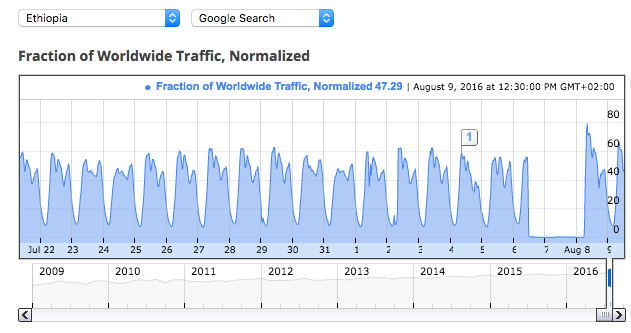
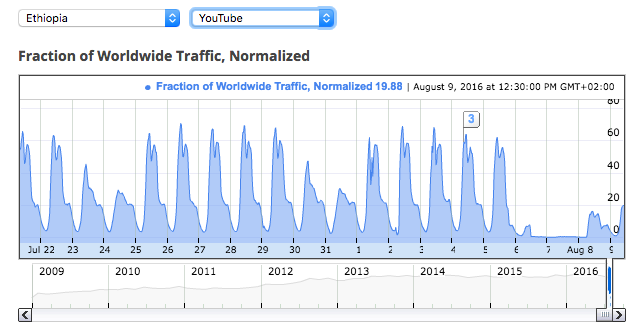
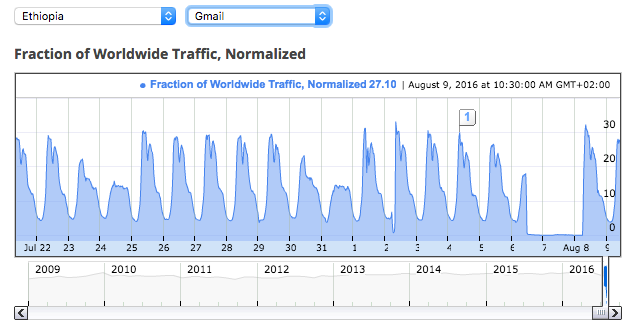
Google products traffic for users from Ethiopia from July 22nd to August 8th

NDT measurements started by users from July 20th to August 8th
The following graph, which we created based on tweets geotagged in Ethiopia
from 3rd-9th August, also illustrates a decrease of Twitter activity.
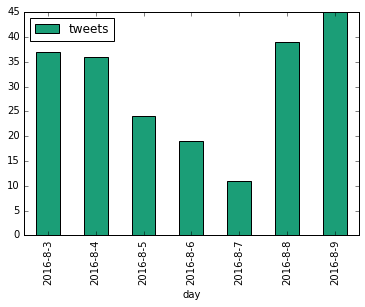
Similarly, Tor metrics data below
illustrates that there was a decrease in the usage of
Tor last weekend, which could be viewed as an
indicator of the internet being restricted or shut down in certain types of
networks.
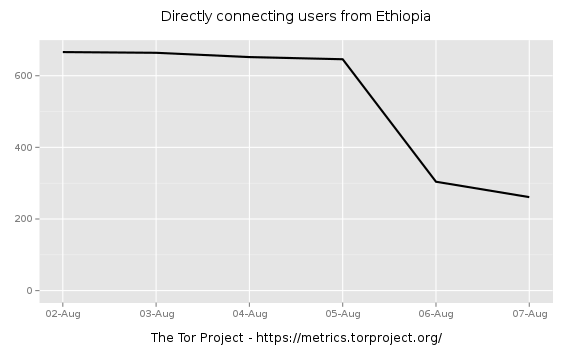
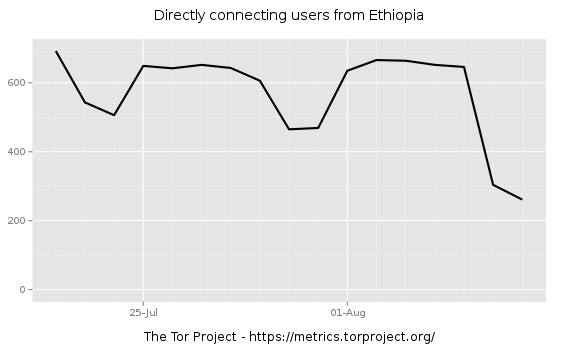
Tor metrics data for direct connecting users
The data included in the graphs above shows that while the internet was likely
shut down in certain regions and/or types of networks, it probably wasn’t shut
down completely across Ethiopia. It might also have been the case that access
to certain websites was restricted in regions and/or networks where the
internet was accessible, though we unfortunately don’t have any recent OONI
measurements from Ethiopia to
verify this.
#KeepItOn campaign
Internet shutdowns effectively pose restrictions on demonstrations and on human
rights generally.
In the recent case of Ethiopia, shutting down the internet in the middle of
intense protests likely not only had an effect on the mobilization and
coordination of protesters, but also on the communication between families and
friends of victims. This also likely had an effect on journalists reporting on
the protests in real-time on the ground, if they were using networks that were
blocked.
An Al Jazeera reporter in Addis Ababa cited difficulties to connect to the
internet and restricted travel to protest zones as a cause for limited coverage
of the protests.
But Ethiopia is not the only country restricting access to the internet during
political events.
At least 20 cases of internet
shutdowns have been documented
worldwide over the last six months alone. In response to this, Access
Now is leading a campaign in collaboration with
organizations around the world called #KeepItOn.
The #KeepItOn campaign aims to document
and raise awareness about internet shutdowns around the world. We support this
campaign, and we hope you will too.
This article was drafted as part of a collaboration between
OONI and the Centre for Intellectual Property
and Information Technology Law (CIPIT) department of
Strathmore University.